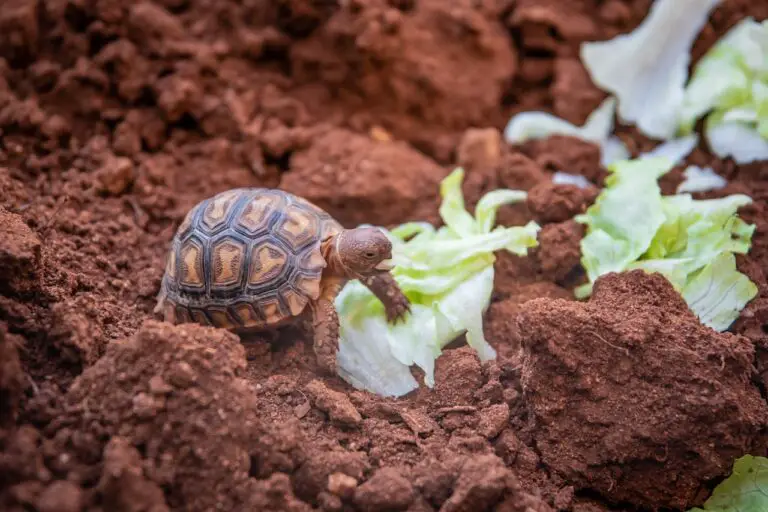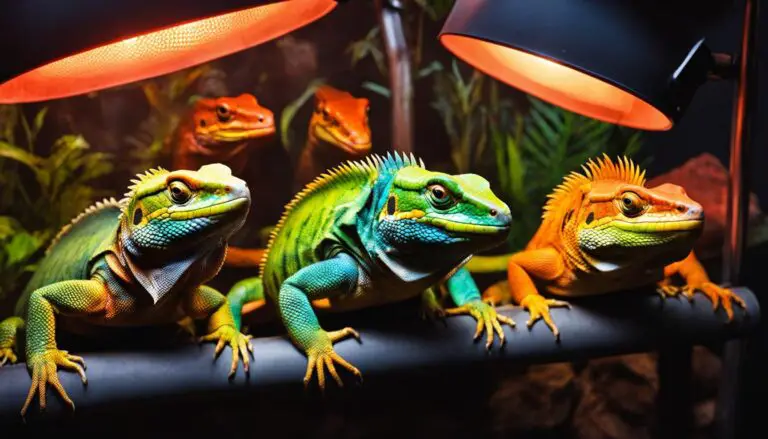Exotic Reptile Adoption: Find Your New Pet
Are you considering adding a unique and fascinating pet to your family? Exotic reptile adoption could be the perfect choice for you. With changes in wildlife importation laws and the increasing popularity of reptiles as pets, adopting an exotic reptile has never been easier or more exciting.
Whether you’ve always been captivated by the beauty of snakes, curious about the complexity of chameleons, or intrigued by the gentle nature of tortoises, there is an exotic reptile out there waiting to be your perfect companion.
But before you dive into the world of exotic reptile adoption, it’s crucial to understand the responsibilities and considerations that come with it. From the adoption process to finding reputable rescues, there are a few things you need to know to ensure a smooth and successful adoption.
Key Takeaways:
- Exotic reptile adoption offers a unique and fascinating pet ownership experience.
- Changes in wildlife importation laws have made it easier to adopt exotic reptiles.
- Research different reptile species to find the one that best suits your lifestyle.
- Contact reputable rescue organizations or animal shelters specializing in reptile adoption.
- Be aware of any restrictions or regulations that apply to exotic reptile adoption.
Reptile Adoption Process
Adopting an exotic reptile is an exciting endeavor. The process involves several important steps to ensure that the reptile is placed in a suitable and loving home. Here’s a breakdown of the reptile adoption process:
- Research Different Reptile Species: Before adopting a reptile, it’s crucial to research and understand the different species available. Each reptile has unique care requirements, temperaments, and environmental needs. By researching and learning about different reptile species, potential adopters can identify the one that aligns best with their lifestyle and abilities.
- Contact Reputable Rescue Organizations: Once a suitable reptile species has been identified, potential adopters can reach out to reputable rescue organizations or animal shelters that specialize in reptile adoption. These organizations have extensive knowledge and experience in caring for reptiles and can guide adopters through the adoption process.
- Fill out an Adoption Form: To start the adoption process, adopters may need to fill out an adoption form. This form helps gather information about the adopter’s experience with reptiles, their living conditions, and their commitment to providing a safe and suitable environment for the reptile.
- Provide Proof of Proper Enclosure and Supplies: Adopters are often required to provide proof of a proper enclosure and necessary supplies before the adoption is finalized. This ensures that the reptile will be entering a safe and appropriate habitat. The enclosure should meet the specific size and environmental requirements of the reptile species being adopted.
Quote:
“The reptile adoption process is a thorough journey that ensures the well-being of the reptile and the suitability of the adopter. It’s important for potential adopters to do their research, reach out to reputable organizations, and be prepared to provide a suitable habitat and care for their new scaly friend.” – Dr. Sarah Collins, Reptile Adoption Specialist
Reptile Adoption Requirements:
| Requirement | Description |
|---|---|
| Adoption Form | Filling out an adoption form to provide information about the adopter’s experience and living conditions. |
| Proper Enclosure | Proof of a suitable enclosure that meets the specific size and environmental requirements of the reptile species being adopted. |
| Supplies | Providing necessary supplies such as heating elements, UVB lighting, substrate, hiding spots, and appropriate food. |
| Educational Resources | Access to educational resources to ensure the adopter is informed about the specific needs and care requirements of the adopted reptile. |
By following the reptile adoption process, potential adopters can make an informed decision and provide a loving home for an exotic reptile. Remember, adopting a reptile is a lifelong commitment that requires time, dedication, and responsible guardianship.
Finding Exotic Reptiles for Adoption
Searching for a new scaly friend? Look no further! Finding exotic reptiles for adoption is easier than you might think. Whether you’re an experienced reptile enthusiast or a first-time reptile owner, there are several avenues you can explore to find your perfect cold-blooded companion.
Online Directories and Animal Shelters
One of the most convenient ways to find exotic reptiles for adoption is through online directories of reputable reptile rescue organizations. These directories provide a centralized database of available reptiles that are in need of a loving home. Take your time to browse through the listings and read the profiles of the reptiles to find one that matches your preferences and lifestyle.
Another option is to visit local animal shelters that specialize in reptile adoption. These shelters often have a variety of reptiles available for adoption, ranging from snakes to lizards and even turtles. By adopting from a shelter, you not only provide a forever home for a reptile in need but also support the important work these organizations do in rescuing and rehabilitating reptiles.
Reptile Expos and Herpetological Society Meetings
Attending reptile expos and herpetological society meetings can be an exciting way to find exotic reptiles for adoption. These events bring together reptile enthusiasts, breeders, and rescue organizations in one place, offering a wide selection of reptiles available for adoption.
At reptile expos, you can interact directly with breeders and rescue organizations, ask questions about the reptiles’ history and care requirements, and even handle them if permitted. This hands-on experience allows you to assess the compatibility between you and the reptile before making a decision.
Considerations for Adoption
When searching for exotic reptiles for adoption, it’s crucial to consider the location of the rescue organization or shelter. Transportation and travel restrictions may apply when adopting a reptile, especially if the organization is in a different state or country. Make sure to familiarize yourself with any applicable regulations and plan accordingly.
Additionally, take the time to educate yourself about the specific needs and care requirements of the reptile species you’re interested in. Each species has unique environmental, dietary, and handling needs that must be met to ensure their well-being. Being well-informed will not only help you provide the best care for your new companion but also strengthen the bond between you.

| Pros of Finding Exotic Reptiles for Adoption | Cons of Finding Exotic Reptiles for Adoption |
|---|---|
| – Provides a loving home for a reptile in need | – Limited availability of certain species |
| – Supports reputable rescue organizations and shelters | – May require transportation arrangements |
| – Opportunity to adopt an already acclimated reptile | – Potential for existing health or behavioral issues |
| – Lower cost compared to purchasing from a breeder | – Selection may be limited in some areas |
As you embark on your journey to find an exotic reptile for adoption, remember that patience and careful consideration are key. Take the time to research and understand the responsibilities that come with owning a reptile. By opening your heart and home to an exotic reptile in need, you not only gain a fascinating companion but also contribute to the preservation and well-being of these incredible creatures.
Reptile Adoption Center Process
Reptile adoption centers, such as Arrowhead Reptile Rescue, play a vital role in the process of rehoming reptiles. They have developed a thorough and systematic approach to ensure that each reptile finds a suitable and caring home. Let’s take a look at the adoption process at a reptile adoption center.
Researching Potential Adopters
One important step in the reptile adoption process is researching potential adopters. Adoption centers like Arrowhead Reptile Rescue carefully assess individuals to determine if they can provide the necessary care and environment for the reptile. This helps ensure that the reptile will be well-cared for and receive the attention it needs.
Adoption Fees and Donations
Reptile adoption centers often require adoption fees or donations from adopters. These fees help cover the costs associated with caring for the reptiles, including food, medical expenses, and maintaining the facilities. By contributing financially, adopters directly support the rescue and rehabilitation efforts of the adoption center.
Species Restrictions and Regulations
It’s important to note that reptile adoption centers may only accept certain reptile species or have restrictions based on state and federal regulations. These restrictions are in place to ensure the welfare and safety of both the reptiles and the adopters. It is essential for adopters to be aware of these regulations and comply with them during the adoption process.
Reptile adoption centers play a crucial role in finding loving homes for reptiles in need. Their careful screening process, adoption fees, and adherence to regulations ensure that reptiles are placed in environments where they will thrive and receive proper care.
If you’re considering adopting a reptile, reaching out to a reputable reptile adoption center is a great way to find a scaly companion. Not only will you be able to provide a forever home for a reptile in need, but you’ll also be supporting the important work of these organizations.
Responsible Reptile Guardianship
Responsible reptile guardianship is essential for ensuring the well-being and happiness of your adopted reptile. As a responsible reptile owner, you play a crucial role in providing the necessary care, habitat, and nutrition for your scaly companion.
First and foremost, it’s important to create an environment that mimics the reptile’s natural habitat. This includes accurate temperature and humidity levels, appropriate lighting, and suitable enclosures. Cleanliness is also paramount to maintain a healthy living space for your reptile.
Regular veterinary care is crucial for reptile health and should never be overlooked. Reptiles, like any other pets, may require routine check-ups and vaccinations to prevent illnesses. In case of any health concerns, it is important to seek professional advice from a reptile veterinarian.
Educating yourself on the specific needs and behaviors of your adopted reptile species is vital. Each reptile species has unique requirements when it comes to diet, handling, and interaction. By understanding their natural behaviors and preferences, you can provide a stimulating and enriching environment for your reptile.
Remember, owning a reptile is a long-term commitment. You should be prepared to provide care throughout their lifespan, which can be several decades for some species. Take the time to research and learn about responsible reptile guardianship before bringing one into your home.
“Providing a suitable and enriching environment is crucial for the well-being of reptiles in captivity.”
Reptile Adoption Restrictions and Regulations
When adopting an exotic reptile, it’s crucial to familiarize yourself with the state and federal reptile adoption regulations and state import/export requirements. These regulations are in place to ensure the welfare and protection of reptiles and to prevent the spread of invasive species. Failure to comply with these regulations can result in legal consequences and harm to the reptiles and their ecosystems.
Different states and countries may have specific rules governing the transportation, ownership, and breeding of certain reptile species. These regulations may include restrictions on the types of reptiles that can be adopted, licensing requirements for owners, and documentation for import or export. It’s essential for adopters to research and understand these regulations to ensure a legal and ethical adoption process.
The well-being of reptiles and the preservation of their natural habitats are of utmost importance in the adoption process. By adhering to state and federal reptile adoption regulations and import/export requirements, adopters can contribute to the responsible and sustainable management of the reptile trade.
To provide a comprehensive overview, listed below are some key considerations when it comes to reptile adoption regulations:
- Research and familiarize yourself with the specific regulations in your state or country regarding reptile adoption.
- Ensure you understand the restrictions on the species of reptiles that can be adopted. Some reptiles may be protected or restricted due to conservation efforts or potential threats to the ecosystem.
- Check if there are any licensing requirements or permits needed to legally own and care for reptiles. These permits may vary depending on the species and the purpose of ownership, such as for personal pets or educational purposes.
- Comply with import and export requirements if you plan to adopt a reptile from another state or country. These requirements may include health certificates, quarantine periods, and documentation.
- Consult with reputable reptile adoption centers or organizations for guidance on legal and ethical adoption practices.
State and Federal Reptile Adoption Regulations
State and federal reptile adoption regulations are established to protect reptiles and ensure a responsible adoption process. These regulations vary between regions and may include restrictions on certain reptile species, licensing requirements, and documentation for import or export. Adhering to these regulations is crucial for the well-being and preservation of reptiles.
State Import/Export Requirements
State import/export requirements for reptile adoption govern the transportation of reptiles across state lines. These requirements differ depending on the reptile species and the states involved. It’s important for adopters to research and comply with these regulations to ensure the legal and ethical transport of reptiles.
The Challenges of Reptile Ownership
Reptile ownership can be a rewarding experience, but it also comes with its fair share of challenges. As with any pet, reptiles have specific environmental and dietary needs that must be met to ensure their health and well-being.
One of the key challenges in exotic reptile care is providing them with a specialized habitat. Different reptile species have different habitat requirements, such as temperature, humidity, and substrate preferences. Creating and maintaining the ideal environment can be a complex task that requires careful research and attention to detail.
Another challenge is meeting the reptile’s specific dietary needs. Reptiles have different feeding habits and nutritional requirements compared to other pets. Some reptiles are strict herbivores, while others are carnivores or omnivores. It’s crucial to understand the dietary needs of your specific reptile and provide them with a proper diet to ensure their overall health and longevity.
Regular veterinary visits are also essential for the well-being of reptiles. A reptile veterinarian with expertise in exotic animal care can provide important health evaluations, perform necessary vaccinations, and offer guidance on preventive care. Keeping up with veterinary appointments and addressing any health concerns promptly is vital for maintaining the health of your reptile.
The Importance of Specialized Knowledge
Handling and caring for reptiles require specialized knowledge and skills. Unlike traditional pets like cats or dogs, reptiles may not be as responsive to human interaction and may have specific handling requirements to prevent injury or stress. It’s essential to educate yourself on proper handling techniques and understand the behavior and body language of your reptile.
Image:

Conclusion
Adopting exotic reptiles can be a truly rewarding experience for those who are dedicated to providing the necessary care and attention. Reptile adoption centers and rescue organizations play a crucial role in ensuring the well-being and rehoming of unwanted reptiles, providing a valuable service to both the animals and potential adopters.
By adopting responsibly and adhering to regulations, individuals can not only find their perfect scaly companion but also contribute to the responsible guardianship of exotic reptiles. Proper care, suitable habitats, and nutritious diets are essential for the health and happiness of these unique pets. It is important to educate oneself about the specific needs and behaviors of the reptile species one plans to adopt.
Whether you are a seasoned reptile owner or new to the world of exotic pets, the joy of seeing your reptile thrive under your care is unparalleled. Adopting an exotic reptile is not only an opportunity to experience the wonder of these incredible creatures but also to make a positive impact on their lives. Join the growing community of reptile enthusiasts and consider adopting an exotic reptile today!
FAQ
What is the process for adopting an exotic reptile?
The process involves researching different reptile species, contacting rescue organizations or shelters, filling out an adoption form, and providing proof of a suitable enclosure and supplies.
Where can I find exotic reptiles for adoption?
You can search online directories of reptile rescue organizations, visit local animal shelters, attend reptile expos or herpetological society meetings to find exotic reptiles available for adoption.
What is the process at a reptile adoption center?
Reptile adoption centers have a thorough process for rehoming reptiles. They research potential adopters, require adoption fees or donations, and may have restrictions based on regulations.
What does responsible reptile guardianship involve?
Responsible reptile guardianship includes providing proper care, habitat, nutrition, and access to veterinary care. It also requires educating oneself about the specific needs and behaviors of the adopted reptile.
Are there any restrictions or regulations for reptile adoption?
Yes, different states and countries may have specific rules regarding the transportation and ownership of certain reptile species. It’s important to research and comply with these regulations.
What are the challenges of reptile ownership?
Reptiles have specific environmental, dietary, and veterinary needs that must be met. They require specialized habitats, temperature and lighting requirements, and a proper diet. Handling and caring for them also require specialized knowledge.
Source Links
- http://www.exoticedventures.com/adoptables.html
- https://www.arrowheadreptilerescue.org/intake/
- https://www.petfinder.com/other-pets/reptiles/reptiles-as-pets/
Peter Stones is the founder of Exotic Pets Place, the leading online resource for exotic pet care information.
With over 10 years of hands-on exotic pet ownership experience, he is deeply passionate about sharing his expertise to help others properly care for their unusual pets.
When he's not writing extensively researched articles or connecting with fellow exotic pet enthusiasts worldwide, you can find Peter at home tending to his own beloved menagerie of exotic animals.


![Creating the Perfect Aquarium for Exotic Aquatic Pets [Full Guide], a girl looking at a fish tank](https://exoticpetsplace.com/wp-content/uploads/2023/06/Creating-the-Perfect-Aquarium-for-Exotic-Aquatic-Pets-Full-Guide-a-girl-looking-at-a-fish-tank-768x512.jpg)




